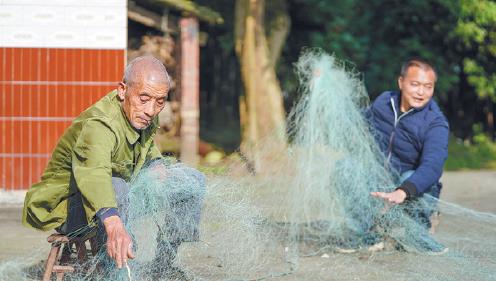
Workers with the fishery administrative department in Wuhan, Hubei province, load a dismantled fishing boat from the Yangtze River onto a truck on Jan 6. (Photo: Xinhua)
HEFEI-Zhu Changhong, who once fished the Yangtze River for a living, skillfully scooped up a plastic bottle with a net while patrolling the water in his boat on a cold January afternoon.
"There is not much trash to collect in winter, as the water is low," the 54-year-old said.
He said farewell to his old job early last year when authorities outlawed fishing along a 58-kilometer stretch of the Yangtze to protect finless porpoises.
A 10-year fishing ban on 332 key areas of the river was fully implemented this year to protect biodiversity in the country's longest river. Among the areas affected is the river section where Zhu lives, Datong township in Tongling, Anhui province.
Yu Kangzhen, vice-minister of agriculture and rural affairs, said the fishing ban is regarded as a key move to stop the depletion of biological resources and degradation of biodiversity in the Yangtze River, which has been damaged by overfishing and pollution.
It's estimated the ban will affect more than 110,000 fishing boats and 280,000 fishermen in 10 provincial-level regions along the river. The ministry has promised to provide social security services, financial support and vocational training for fishermen who have to find a new way of earning a living.
Bigger picture
Unlike other fishermen who have found jobs in factories or become security guards, Zhu and his wife continue to earning a living from the river.
With the help of the local government, they joined a team to clean up floating trash and report sightings of finless porpoises, a job that earns them 5,000 yuan ($726) a month.
Known for its mischievous smile, the finless porpoise has a level of intelligence similar to that of a gorilla. However, it needs an abundant food supply and in recent years, overfishing in the Yangtze has contributed to a decrease in its number.
The river mammal is teetering on the brink of extinction, with a population of around 1,000 in the main waterway of the Yangtze, according to research conducted in 2017.
Zhu used to love watching the river dolphins swimming near the shore searching for small fish. However, as he grew older he observed the impact of an influx of fishing boats on the dolphins.
"I even saw dead dolphins injured by the blades of fishing boats as they love to follow them," said Zhu, adding that he and other fishermen in Datong understand the big picture of the fishing ban.
"There used to be a lot of fish in the river, and we always came back fully loaded. But now, we don't catch as much, even with advanced gear," Zhu said.
Instead of fishing on the river, Zhu and his wife patrol 10 to 15 km of the waterway every day, sometimes collecting up to 200 kilograms of trash.
"It reminds me of my childhood when I see finless porpoises during the patrol," Zhu said. "It's an honor to protect these angels of the Yangtze River."
The city of Tongling is not alone in its efforts to protect the Yangtze River. About 100 km downstream from Datong lies Ma'anshan city, which launched a fishing ban on July 1.
A new line
Fisherman Zheng Laigen, 44, still earns a living from fish, but not the traditional way. Taking advantage of expertise he gained over the years, he is now the owner of a fish farm and manages about 13 hectares of ponds, raising crabs, shrimp and fish.
"The last decade has witnessed the depletion of fish stocks. We could catch about 40 kg of fish per day previously, but the number has slumped to less than 15 kg now," Zheng said.
More than 10,000 fishermen like Zheng stopped fishing last year. His nine fishing boats were dismantled in May, and he was given a 200,000 yuan subsidy by the local government. The government also provided him with a 40,000 yuan housing allowance.
His new business has prospered, with annual income estimated at 300,000 yuan. In the peak season in summer, he had to hire four people to help with the work on the fish farm.
To address housing problems, the local government helped families buy or rent houses below the market price. Many of the fishermen and their families lived on their riverboats.
Zhang Laixi, an ex-fisherman, owns a 60-square-meter apartment in a residential area built for fishermen moving ashore. "The government grants 15 square meters for each person. I needed more, so I just paid for the extra space," he said.
Apart from housing, the local government also organized job fairs and training classes for the fishermen.
Zhang, who has been fishing for 20 years, said he has no intention of working in a factory and now runs a convenience store in his community.
"It runs pretty well with an average daily turnover of 1,000 yuan. It's not much, but I really enjoy the freedom I have," Zhang said.


